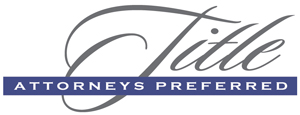| |
An escrow is an
arrangement in which a disinterested third party, usually
the title company, holds legal documents and funds on behalf
of the buyer, seller, and lender, and distributes them
according to the buyers, sellers, and lender's instructions.
An escrow is convenient for all involved because each party
can move forward separately but simultaneously in providing
inspections, reports, loan commitments and funds, documents,
and many other items, using the escrow holder as the central
depositing point.
The escrow agent
is responsible for processing and coordinating the flow of
documents and funds, keeping all parties informed of
progress, responding to the lenders requirements,
coordinating legal document preparation and title work,
prorating taxes and other items, preparing the final
settlement statement of closing for each party, obtaining
proper approval of documents and proper signatures,
disbursing funds for title insurance, real estate
commissions, line clearances, etc., and recording the deed
and other documents.
Escrow payment is the common term referring to the portion
of a
mortgage
payment that is designated to pay
for
real property taxes and
hazard insurance. It is an amount
"over and above" the
principal and
interest portion of a mortgage
payment. Since the escrow payment is used to pay taxes and
insurance, it is referred to as "T&I", while the mortgage
payment consisting of principal and interest is called
"P&I". The sum total of all elements is then referred to as
"PITI",
for "Principal, Interest, Tax, and Insurance". Some mortgage
companies require
customers to maintain an escrow
account that pays the property taxes and hazard insurance.
Others offer it as an option for customers. Some types of
loans, most notably
Federal Housing Administration
(FHA) loans, require the lender to maintain an escrow
account for the life of the loan.
The
monthly escrow payment is calculated by taking the total of
all anticipated tax and insurance disbursements for the
coming year, and dividing that number by 12. In addition, if
the mortgage company requires a minimum
balance in the escrow account
(usually no more than double the monthly escrow payment),
they may add on a shortage adjustment so that the balance
never falls below the minimum balance requirement. If, even
at its lowest point, the escrow account has a projected
balance greater than the minimum balance requirement,
federal guidelines—the Real Estate
Settlement Procedures Act of 1973 (RESPA)—require
that the mortgage company refund the difference to the
customer. |
|

